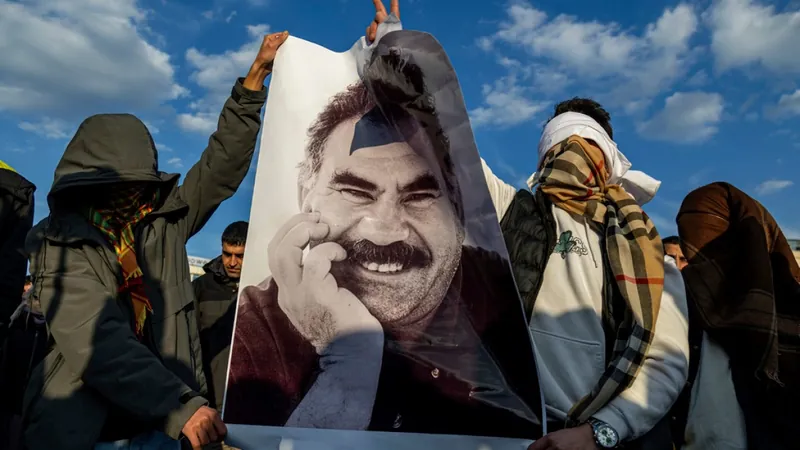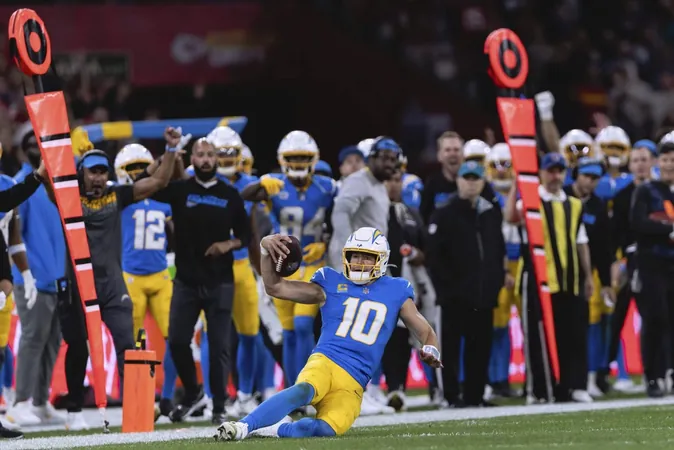
A Groundbreaking Shift: PKK Leader Announces End of Armed Struggle Against Turkey
2025-07-09
Author: Lok
In a startling announcement that could reshape the political landscape in Turkey, Abdullah Ocalan, the imprisoned leader of the Kurdistan Workers' Party (PKK), has declared the end of the group's armed conflict with Turkey. Advocating for a complete transition to democratic politics, Ocalan's announcement marks a potential turning point for Kurdish aspirations.
Ocalan, who has been behind bars since 1999 yet remains a pivotal figure among Kurds, delivered his message through a video recording released by the PKK-aligned Firat News Agency. He termed this change a 'historic gain,' urging the PKK to abandon its weapons and engage in democratic processes.
"This transition signifies a voluntary shift from armed conflict to a focus on democracy and law," stated Ocalan, underscoring the importance of a smooth and sensitive disarmament process for PKK fighters. He emphasized that the establishment of a Turkish parliamentary committee to supervise these developments is crucial.
Ocalan's message comes just days ahead of the first disarmament ceremony for the PKK in northern Iraq, following the group's earlier announcement in May regarding their disbandment after over 40 years of armed struggle against the Turkish state.
Turkish President Recep Tayyip Erdogan has welcomed Ocalan's call for peace, expressing optimism about imminent progress in the peace initiative during a speech to his ruling party lawmakers. "Once the wall of terror is torn down, everything will change for the better, preventing pain and tears for our people," he stated. Erdogan proudly declared the upcoming peace process as beneficial for all Turks, Kurds, and Arabs alike.
However, Aysegul Dogan, spokesperson for Turkey’s pro-Kurdish DEM party, emphasized that the disarmament effort must include legal assurances and mechanisms to facilitate a genuine transition to democratic governance.
Ocalan’s personal journey is steeped in the history of the PKK. Born in 1948 to a poor Kurdish family, he became politically active after studying political science at Ankara University. In 1978, he founded the PKK, leading a separatist rebellion that would claim over 40,000 lives from 1984 to 2024, forcing countless Kurds to flee the violence.
With this pivotal moment, both the PKK and the Turkish government stand at a crossroads, with the potential to forge a new path toward lasting peace and cooperation.


 Brasil (PT)
Brasil (PT)
 Canada (EN)
Canada (EN)
 Chile (ES)
Chile (ES)
 Česko (CS)
Česko (CS)
 대한민국 (KO)
대한민국 (KO)
 España (ES)
España (ES)
 France (FR)
France (FR)
 Hong Kong (EN)
Hong Kong (EN)
 Italia (IT)
Italia (IT)
 日本 (JA)
日本 (JA)
 Magyarország (HU)
Magyarország (HU)
 Norge (NO)
Norge (NO)
 Polska (PL)
Polska (PL)
 Schweiz (DE)
Schweiz (DE)
 Singapore (EN)
Singapore (EN)
 Sverige (SV)
Sverige (SV)
 Suomi (FI)
Suomi (FI)
 Türkiye (TR)
Türkiye (TR)
 الإمارات العربية المتحدة (AR)
الإمارات العربية المتحدة (AR)